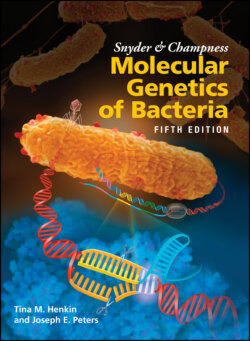Читать книгу Snyder and Champness Molecular Genetics of Bacteria - Tina M. Henkin - Страница 12
About the Authors
ОглавлениеTina M. Henkin is a Professor of Microbiology, Robert W. and Estelle S. Bingham Professor of Biological Sciences, and Distinguished University Professor at The Ohio State University, where she has been teaching microbiology and bacterial genetics since 1995. She received her B.A. in biology at Swarthmore College and her Ph.D. in genetics at the University of Wisconsin-Madison, and did postdoctoral work in molecular microbiology at Tufts University Medical School. Her research focuses on gene regulation in Gram-positive bacteria, primarily using Bacillus subtilis as a model. Her laboratory uncovered the T-box regulatory mechanism, in which the leader RNAs of bacterial genes bind a specific uncharged tRNA to modulate expression of the downstream genes. This work led to the discovery of riboswitch RNAs that bind cellular metabolites to mediate similar regulatory responses. Current work focuses on elucidating the basis for specific ligand recognition and molecular mechanisms for ligand-mediated changes in RNA structure in a variety of riboswitch classes. She is a Fellow of the American Academy of Microbiology, the American Association for the Advancement of Science, and the American Academy of Arts and Sciences, a member of the National Academy of Sciences, and co-winner of the National Academy of Sciences Pfizer Prize in Molecular Biology for her work on riboswitch RNAs.
Joseph E. Peters is a Professor of microbiology at Cornell University, where he has been teaching bacterial genetics and microbiology at the graduate and undergraduate level since 2002. He received his B.S. from Stony Brook University and his Ph.D. from the University of Maryland at College Park. He did postdoctoral work at the Johns Hopkins University School of Medicine, in part as an NSF-Alfred P. Sloan Foundation postdoctoral research fellow in molecular evolution. His research has focused on the intersection between DNA replication, recombination, and repair and how it relates to evolution, especially in the area of transposition. Most recently he has been interested in the evolution of defense systems like CRISPR/Cas systems and how they can be repurposed by mobile elements for new tasks. Research in his lab is funded by the National Science Foundation, the U.S. Department of Agriculture, and the National Institutes of Health. He is the director of graduate studies for the field of microbiology at Cornell.
